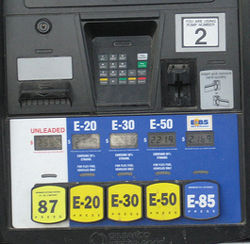 South Dakota Governor Dennis Daugaard says $950,000 in grants will be made available through the Governor’s Office of Economic Development to help pay for the installation of blender pumps and associated infrastructure at retail gas stations across the state.
South Dakota Governor Dennis Daugaard says $950,000 in grants will be made available through the Governor’s Office of Economic Development to help pay for the installation of blender pumps and associated infrastructure at retail gas stations across the state.
Funding for the grant program was made possible by a partnership between South Dakota Ethanol Producers and the State of South Dakota. During the 2011 legislative session, South Dakota Ethanol Producers agreed to a reduction in ethanol producer payments while temporarily allocating a portion of their remaining ethanol producer payments to the blender-pump grant program and a portion to the Revolving Economic Development Initiative fund. South Dakota produces about one billion gallons of ethanol a year, and blender pumps allow motorists to select their desired blends of gasoline and ethanol.
“By making more ethanol blends available, we are improving producer opportunities, creating jobs, and stabilizing our domestic fuel supplies,” says Gov. Daugaard.
South Dakota was the first state in the nation to allow ethanol blender pumps. More than 100 pumps currently help support South Dakota’s 15 ethanol plants and nearly 900 South Dakotans directly employed by the industry.
Grant awards up to $25,000 are available for installation of a station’s first blender pump. Grant awards up to $10,000 are available for installation of each additional pump. The majority of the grants will be awarded on a first-come, first-served basis; the final 20 percent will be awarded competitively. Informational meetings about the blender pump grant program will be held in January. Meeting times and locations will be announced at a later date.
The American Coalition for Ethanol (ACE) praised South Dakota for creating the grant program for the installation of ethanol blender pumps.
ACE Director of Market Development, Rick Serie, says, “South Dakota has continually looked at ways to get more ethanol to consumers and this program will go a long way toward supporting ethanol plants, hundreds of South Dakotans employed by those plants, and the thousands of farmers and local owners that benefit from the economic activity created by ethanol production.”

